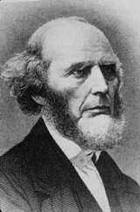CLASSIC SERMONS: TWELVE TIMELESS MESSAGES
Classic Sermons
Chapter Two
 Charles G. Finney Biography: (1792-1875)
AMERICAN REVIVALIST PREACHER AND EDUCATOR.
Charles G. Finney Biography: (1792-1875)
AMERICAN REVIVALIST PREACHER AND EDUCATOR.
Finney
was born in Litchfield County, Conn., on Aug. 27, 1792. He studied law from
1818 to 1821, when he had a sudden conversion experience. After this he began
to preach and was licensed to preach by the Presbyterian denomination in 1824.
Wherever he traveled he started extensive religious revivals.
Finney
was criticized because he emphasized the will of man in the process of
regeneration and employed revival techniques that became known as "New
Measures", calculated to evoke a highly emotional response. Impatient with
Presbyterianism, he became a Congregationalist, serving New York City's
Broadway Tabernacle.
Finney
was appointed professor of theology at Oberlin College (1835), minister of the
First Congregational Church at Oberlin (1837), and was named president of the
college in 1852. His Lectures on Revivals (1835) became a handbook for American
revivalists, and his Lectures on Theology (1846) indicate the modifying
influence of evangelicalism on American Calvinism. Finney died at Oberlin on
Aug. 16, 1875.” – CCEL http://www.ccel.org/f/finney/.
“The
writer (J. Gilchrist Lawson)
is
inclined to regard Charles G. Finney, (a
descendant of the New England Puritans), as the greatest evangelist and
theologian since the days of the apostles. It is estimated that during the year
1857-58 over a hundred thousand persons were led to Christ as the direct or
indirect result of Finney's labours, while five hundred thousand persons
professed conversion to Christ in the great revival which began in his
meetings. Another remarkable fact is that it was found by actual research that
over eighty-five in every hundred persons professing conversion to Christ in Finney's
meetings remained true to God, whereas seventy per cent of those professing
conversion in the meetings of even so great an evangelist as Moody afterwards
became backsliders. Finney seems to have had the power of impressing the
consciences of men with the necessity of holy living in such a manner as to
procure the most lasting results. It is said that at Governeur, New York, not a
dance or theatrical play could be held in the place for six years after Finney
held meetings there. … Finney's writings have had an enormous circulation and
have greatly influenced the religious life of the world. This is especially
true of his "Autobiography," his "Lectures on Revivals,"
"Lectures to Professing Christians," and his "Systematic
Theology." These books have all had a worldwide circulation.” - “A Brief
Biography by J. Gilchrist Lawson, Evangelist from “Deeper Experiences of
Famous Christians” 1911”; http://www.gospeltruth.net/lawsonbio.htm.
Chapter Two :
Man’s Godless State
Sermon: Love of the World
Charles G. Finney (1792-1875)
“Love not the world, neither the things that are in the
world. If any man love the world, the love of the Father is not in him.”” – 1 John 2:15.
“The
love of the world here spoken of, is not every kind or degree of desire for
worldly objects. God has so constituted us, that a certain amount, and certain
kinds of worldly objects are indispensible to our existence. We need food and
raiment, implements of husbandry and trade, and various worldly things; the
proper desire of which is not sinful, nor inconsistent with the love of God.
But to love the world is to make worldly things the principal objects of desire
and pursuit.
To
love them, and desire them more than to love God and man, to be more anxious to
obtain them, and spend more time in their acquisition, than in efforts to
glorify God, and save the souls of men, is to love the world in the sense of
the text. Where the love of God and of men is supreme in the heart, there may
be a suitable desire for worldly objects; but where an individual manifests a
disposition to give the acquisition of wealth, or of worldly objects, the
preference, and aims rather at obtaining worldly things than at glorifying God
and of doing good to men, it is certain that the love of the world is supreme
in his heart.”
Condensed quoted characteristics to
follow:
o All who cheat and defraud to obtain the
things of the world…
o All those whose anxieties and cares are
mostly about worldly things…
o All those who consult only their own
interest in the transaction of business…
o All those that feel chagrined and grieved
when they find that the person with whom they have dealt has the best of the
bargain, and has made a greater profit than themselves…
o All those who will make bargains only when
they can make a profit by it…
o All those who will take advantage of the
ignorance of those with whom they deal, to get a good bargain out of them, love
the world supremely…
o Those who will sell useless articles to
men, for the sake of profit, have not the love of God in them…
o All who sell hurtful articles, for the
sake of the profit, have not the love of God in them…
o All those who transact business upon
principles of commercial justice, rather than on principles of benevolence,
love the world supremely…
o All those who engage in business, to the
neglect of spiritual exercises, love the world supremely…
o Those who make their business an excuse
for not attending meetings and using means for the conversion of sinners…
o All those whose business diverts their
thoughts and affections from God.
o All rich men love the world supremely…
o All those who lay up their surplus
income, have not the love of God in them.…
o Although a man may give his surplus
income, yet if he practise no self-denial, he gives to God that which costs him
nothing, and gives no substantial evidence that he loves God…
o All those who are more interested in
secular news, that relates to money transaction, than in the accounts of
revivals of religion, and in those things that pertain more particularly to the
kingdom of Christ, love the world supremely…
o All those who are more depressed and feel
more keenly commercial and moneyed embarrassments, than they do the low state
of religion and the state of dying sinners, love the world supremely…
o All those who would sooner engage in
moneyed speculations than they would in revivals of religion, love the world
supremely…
o All those who disobey the commandments of
God, for the purpose of making or saving money, love the world supremely…
o All those who do not feel more gratified
with the appropriation of money to the cause of Christ, than with any other
appropriation of it, love the world supremely…
o All those who prefer a speculation to a
contribution for the promotion of the interests of Christ's kingdom, love the
world supremely…
o All those who would rather see a customer
come in to pay them money, than an agent of some benevolent society to receive
and appropriate it to the promotion of Christ's kingdom, love the world
supremely…
o All those who do not really enjoy giving
more than receiving, love the world supremely.
o All those who are more parsimonious in
their expenditures for the kingdom of Christ than in their expenditures upon
themselves and their families, love the world supremely…
“The
text is a form of expression that is to be understood as expressing a very
strong negative. "If any man love the world," says the apostle,
"how dwelleth the love of God in him;" that is, the love of God is
certainly not in him. This is the language and the doctrine of the whole Bible;
so that, so far as Scripture testimony goes, the proof is conclusive. But I
will mention several considerations that belong to the philosophy of mind, that
will demonstrate, beyond all contradiction, that individuals upon whom these
marks of worldliness are found, have not the love of God in them. The argument
runs thus, and is very brief.
1.
It is impossible that a man should have two supreme objects of affection. If he
have any acceptable love to God, it must be supreme; and to affirm that a man
loves the world in the sense of this text, and that he loves God with any
acceptable love, is a contradiction. It is the same as to say, that he loves
both God and the world supremely.
2.
A man cannot love two objects, that are entirely opposite to each other, at the
same time. The apostle immediately subjoins to the text, "for all that is
in the world, the lust of the flesh, the lust of the eye, and the pride of
life, is not of the Father, but of the world." The love of the world, and
the love of God, are directly opposite states of mind, so that to exercise them
both at the same time is impossible.
3.
It is minding the flesh which the apostle declares to be enmity against God.
Lastly.
It is supreme selfishness, which is the direct opposite of the love of God and
man. These considerations need only to be named, to be seen to be proof
conclusive, that if any man love the world, the love of God is not in him.”
Further Study
& Resources:
“The Love of the
World” by Charles G. Finney - http://www.gospeltruth.net/1836SOIS/12sois_loveof_theworld.htm







Comments
Post a Comment